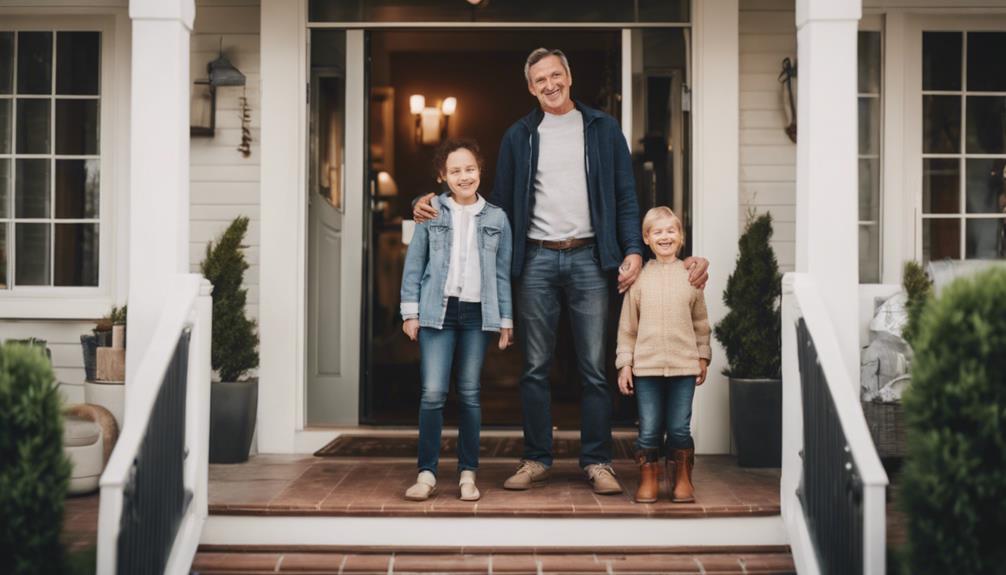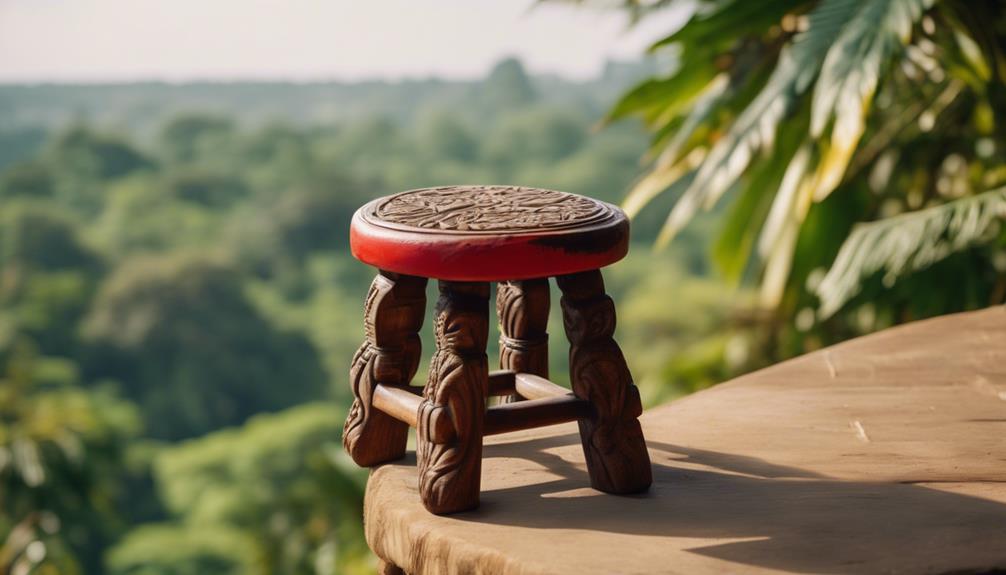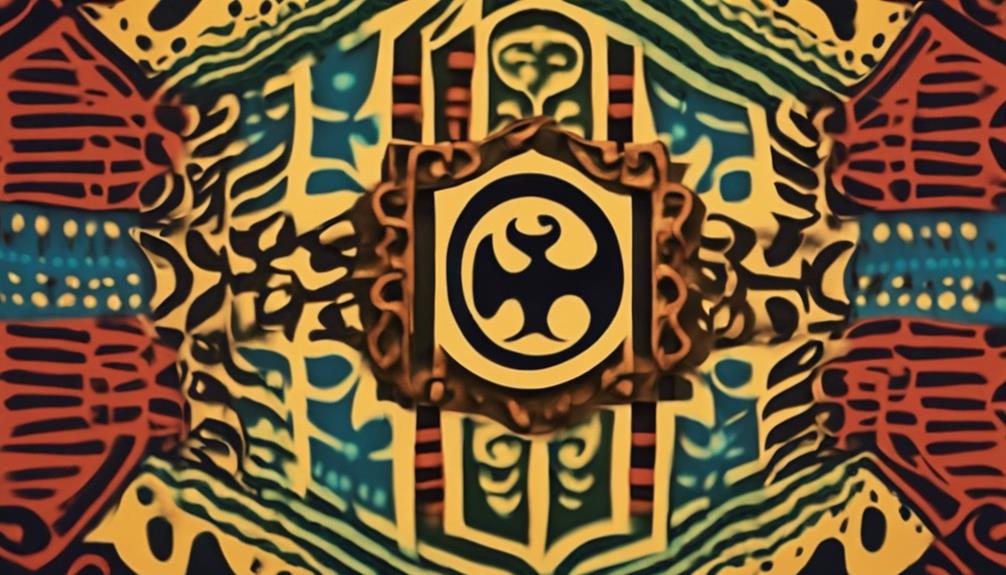Akwaaba means 'Welcome' in the Twi language of the Akan tribe in Ghana. It signifies hospitality, love, care, trust, freedom, and honor. This term is a significant part of welcoming customs for the Akan tribe and is synonymous with hospitality not just in Ghana but across Africa. Akwaaba showcases the warm embrace of visitors and reflects the rich heritage of Ghana, emphasizing inclusivity and communal harmony. It embodies a cultural essence that fosters understanding and respect for others. This expression holds deeper meanings that highlight the values cherished in Ghanaian culture, offering an insight into the profound hospitality traditions of the region.
Key Takeaways
- 'Akwaaba' means 'Welcome' in Twi language of the Akan tribe
- Represents hospitality, love, care, trust, freedom, and honor
- Essential in Akan tribe's welcoming customs
- Symbolizes genuine Ghanaian hospitality and inclusivity
- Showcases rich cultural heritage and friendliness of Ghana
Origins of Akwaaba
Where did the welcoming expression 'Akwaaba' originate from?
Akwaaba, the first words spoken to greet visitors in Ghana, means 'Welcome' in the Twi language of the Akan tribe.
This traditional greeting embodies values such as hospitality, love, care, trust, freedom, and honor. The word has deep cultural roots, symbolizing the warmth and friendliness of the Ghanaian people.
It serves as a heartfelt invitation, extending a sense of belonging to guests. The Akan tribe in Ghana has long used 'Akwaaba' as an essential part of their welcoming customs.
As an integral aspect of Ghanaian culture, this word has transcended its origins and become synonymous with hospitality not only in Ghana but throughout Africa.
The significance of 'Akwaaba' lies in its ability to convey not just a simple welcome, but a profound message of acceptance, respect, and openness towards others.
Cultural Significance

The cultural significance of 'Akwaaba' shines through as it embodies the genuine hospitality and warmth of the Ghanaian people towards their guests. It's a traditional Twi word meaning 'welcome' spoken by the Akan tribe in Ghana. This expression symbolizes love, care, trust, freedom, and honor for visitors.
When someone says 'Akwaaba' in the city of Accra, it means thank you, reflecting the respect and appreciation for guests. This word isn't merely a greeting but a representation of the moral values and standing of Ghanaian culture.
Through 'Akwaaba,' Ghana showcases its rich cultural heritage, friendliness, and acceptance of visitors into its community. It's the official welcoming expression in Africa, signifying the country's openness and readiness to embrace others.
The Akwaaba symbolizes respect for guests and reflects the warm and welcoming nature of Ghanaian society.
Akwaaba in Daily Life

Every day in Ghana, the heartfelt greeting 'Akwaaba' resonates with warmth and hospitality, embodying the nation's tradition of welcoming guests with love and respect. This customary gesture goes beyond words, reflecting a profound cultural ethos that shapes daily interactions.
The significance of Akwaaba in daily life can be understood through the following points:
- Expression of Warmth: Akwaaba serves as a sincere expression of warmth and care towards visitors, reflecting the values of compassion and empathy.
- Symbol of Honor: By using Akwaaba, Ghanaians honor their guests, recognizing their presence as a valuable addition to the community.
- Cultural Tradition: The regular use of Akwaaba highlights Ghana's rich cultural heritage, emphasizing the importance of hospitality in societal norms.
- Inclusivity: Through Akwaaba, individuals are welcomed into spaces with openness and inclusivity, fostering a sense of belonging and unity within the community.
In essence, Akwaaba in daily life not only signifies a simple greeting but also encapsulates the essence of Ghanaian culture, rooted in hospitality, respect, and communal harmony.
Symbolism in Hospitality

Reflecting the essence of genuine Ghanaian hospitality and warmth, Akwaaba symbolizes a profound connection between hosts and guests, embodying values of love, care, trust, and honor. This traditional expression goes beyond mere words, representing a deep-rooted cultural belief in treating visitors with respect and kindness.
By using Akwaaba, Ghanaians convey their sincere welcome and create a sense of belonging for those entering their space. This symbol of hospitality not only showcases the moral standing of Ghana but also serves as an official welcoming gesture for guests entering Africa.
Through Akwaaba, the spirit of openness, freedom, and mutual understanding is fostered, enhancing the bond between visitors and the local environment. It's a powerful representation of the values of community, generosity, and goodwill that are integral to the Ghanaian way of life.
Akwaaba Adinkra Symbol

The Akwaaba Adinkra symbol holds deep cultural significance in Ghana, symbolizing a warm welcome to visitors.
It represents the idea of inclusivity and hospitality, inviting all into the embrace of an African family.
Through symbols like Akwaaba, Ghanaians continue to showcase their tradition of warmth and generosity towards guests.
Symbolic Meaning of Akwaaba
Symbolizing warmth and generosity towards visitors in Ghana, the Akwaaba Adinkra symbol conveys cultural values and myths in Ghanaian traditions. The deeper meaning behind Akwaaba includes:
- Embracing visitors with open arms and a welcoming heart.
- Signifying a sense of unity and belonging within the African family.
- Reflecting the spirit of hospitality deeply rooted in Ghanaian culture.
- Inviting individuals to acclimate to the inviting and warm Ghanaian environment.
These symbolic representations encapsulate the essence of Akwaaba, portraying a culture rich in hospitality and inclusivity. The symbol serves as a visual representation of the values cherished by Ghanaians, welcoming all with a spirit of openness and kindness. The Akwaaba symbol, much like the complex layers found in understanding kaiju symbolism, extends beyond mere representation; it reflects deep-rooted traditions and societal norms. Just as kaiju symbolism often highlights themes of destruction and regeneration, Akwaaba captures the duality of embracing strangers while preserving the integrity of one’s cultural identity. Both forms of symbolism invite a deeper analysis of how societies communicate values and adapt in the face of external influences.
Cultural Significance of Akwaaba
Embracing visitors with open arms and a welcoming heart, the Akwaaba Adinkra symbol embodies Ghanaian cultural values of hospitality and inclusivity. This symbol, deeply rooted in Ghanaian traditions, promotes warmth and generosity towards guests.
Adinkra symbols, like Akwaaba, convey cultural values and myths, enriching the Ghanaian cultural experience. Despite historical challenges, Ghanaians continue to express hospitality through symbols such as Akwaaba, symbolizing the welcoming of all into a happy African family. This fosters a sense of belonging and helps visitors acclimatize to the warm and inviting Ghanaian environment.
The Akwaaba symbol, with its open arms and inviting posture, reflects the essence of Ghanaian hospitality and the spirit of unity that defines the country's cultural identity.
Embracing Guests With Akwaaba

Radiating warmth and authenticity, Akwaaba extends a heartfelt welcome to guests, embodying the spirit of Ghanaian hospitality. When guests are embraced with Akwaaba, they experience a profound sense of inclusion and respect. This tradition goes beyond a simple greeting; it signifies a deep-rooted cultural value of hospitality that's ingrained in Ghanaian society.
Here are four deeper meanings of embracing guests with Akwaaba:
- Inclusivity: Akwaaba communicates a message of openness and acceptance, making guests feel like an integral part of the community.
- Respect: By offering Akwaaba, hosts show reverence and honor towards their guests, valuing their presence and well-being.
- Connection: Through Akwaaba, a genuine connection is established, bridging the gap between hosts and guests in a meaningful way.
- Hospitality: Akwaaba embodies the essence of hospitality, creating a warm and inviting atmosphere where guests are treated with kindness and care.
Spreading Akwaaba Worldwide

Moving beyond its traditional roots, the concept of Akwaaba is now resonating globally, embodying a universal spirit of hospitality and welcome. Originating from the Akan tribe in Ghana, the word 'Akwaaba' means 'welcome' and symbolizes the warm embrace and openness of the Ghanaian people.
While it has been an official welcoming expression in Africa for years, its significance has expanded beyond borders. Akwaaba has become synonymous with Ghana, serving as a heartfelt greeting to visitors entering the country. This expression not only welcomes guests physically but also emotionally connects Africans in the diaspora to their heritage, fostering a sense of belonging and cultural pride.
Frequently Asked Questions
What Does the Akwaaba Symbol Mean?
The Akwaaba symbol in Ghana signifies a warm welcome and hospitality towards visitors. It embodies cultural values and Akan myths, showcasing the nation's enduring tradition of openness and friendliness.
Ghanaians use the Akwaaba symbol to greet all guests, making them feel like part of a joyful African family. This symbol helps newcomers adjust to the inviting and cheerful atmosphere of Ghana, fostering a sense of belonging and acceptance.
Yes, "Akwaaba" Means Welcome in the Akan Language Spoken in Ghana
Yes, 'Akwaaba' indeed means 'welcome' in the Akan language spoken in Ghana. It serves as a significant greeting that embodies hospitality and warmth towards visitors.
When visitors hear 'Akwaaba,' they feel a sense of belonging and acceptance in Ghanaian culture. This term symbolizes traditional African values like love, care, trust, freedom, and honor.
Saying 'Akwaaba' is a genuine gesture that reflects the hospitality and friendliness of the Ghanaian people.
What Does Akwaaba Mean in Ivory Coast?
In Ivory Coast, 'Akwaaba' doesn't hold the same significance as in Ghana. Instead, the equivalent greeting used is 'Bienvenue,' meaning 'welcome' in French.
Variations in cultural context and language between the two countries influence the choice of specific greetings.
To navigate interactions effectively in Ivory Coast, it's important to comprehend the local language and customs. Understanding these nuances enhances the depth of meaningful exchanges in this unique cultural setting.
How Do You Respond to Akwaaba?
When responding to Akwaaba, we typically say 'Medaasi,' which means thank you in the Akan language. This acknowledges the warm welcome and shows appreciation for the hospitality received.
Saying 'Medaasi' reflects gratitude and fosters positive interactions. It's a simple yet meaningful way to reciprocate the kindness extended to us.
Conclusion
So there you have it, folks. Akwaaba isn't just a word – it's a whole lot more. From its origins in Ghana to its global impact on hospitality, this simple greeting carries a world of meaning.
So next time you welcome someone with an 'akwaaba,' remember the rich history and symbolism behind it. Let's keep spreading the spirit of akwaaba, one warm greeting at a time.
Welcome, welcome, welcome!










